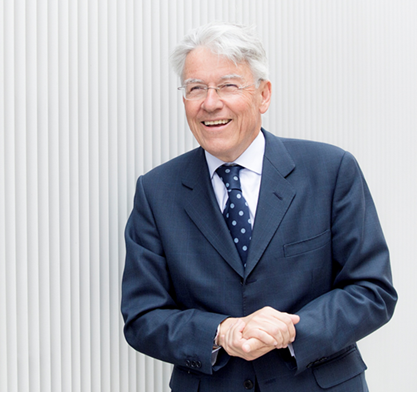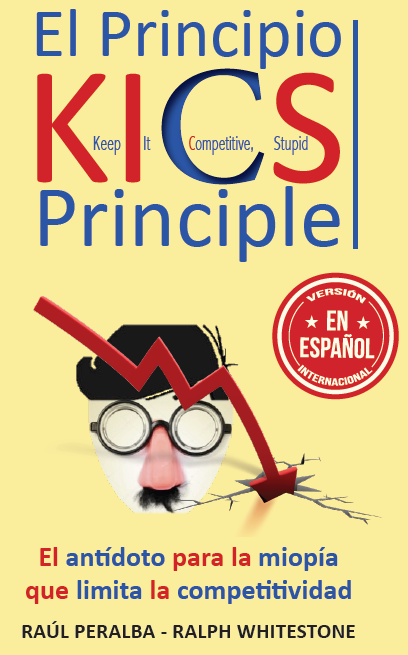Introduction
This article is an adaptation made by the author from the introduction of his book, of the same title, written with Ralph Whitestone. It is currently available in Spanish via Amazon and will be published in English soon.
The aeronautical engineer Clarence “Kelly” Leonard Johnson was a true innovator in the aerospace industry. He worked for many years at Lockheed Martin Skunk Works (secret projects department) and was highly regarded for his organizational skills and for dealing with highly complex matters. One of his biggest skills was the ability to break problems down and simplify them so that everybody involved in his projects was very clear about it all. I.e.: he recommended simple and understandable developments which could only cause errors that were easy to detect and correct, rejecting complications.
Because of his obsession to simplify things he coined the phrase “Keep It Simple, Stupid” in order to rally his team. A phrase that was made famous in the 60s as a result of Kelly’s involvement in the Apollo project. It later derived into an acronym known as the KISS Principle. The “KISS” acronym made it easier to remember, sounds good and became popular.
Being simple is not a quality among human beings; maybe this is why Johnson made it his motto. In recent years, this phrase was popularized again by Bill Clinton, who in one of his campaigns coined the “It’s the economy, stupid”, probably a reason for his success.
As a result of technology under continuous evolution, instant communications, a global economy, increasing business activities and a stressed life, the environment is confusing people’s minds, leading them away from the basics. In the words of Abraham Lincoln: “To decide on critical matters, one must use simple language, logic and common sense, and establish a specific action plan”.
It is not uncommon to find an increasing number of persons going from one guru to the next seeking magical advice to resolve their problems. It is also not surprising to see so many returning to the University or reading all possible self-help books looking for rescue recipes and attempting to find an efficient model that leads them to success in their life. (Unfortunately, there are those that try to take advantage of them…).
Well, my reader friends, professional life is much simpler than what many believe. The problem is that there are too many people dedicated to making it complicated and awkward. The solution to survival in this situation is to be simple. It is that easy, and difficult; just a matter of simplifying things. I.e.: simplify complexities and, above all, do not complicate what is simple.
Looking at the evolution of humanity, it would seem that previously, in a less complex world, things were easier. However, this was not the case and the so-called “experts in complicating things” have always existed.
Well, after over twenty years dedicated to working with companies and institutions of all sizes, industries, philosophies and activities in many countries around the world, applying this perspective to problems, I have realized that people in charge of competitive strategy fail to fulfil the KISS principle. Even contradicting it. Instead of simplifying, they complicate to make things look more interesting.
This experience caused me a certain “catharsis” and clearly see that being simple is closely related to being competitive. If potential customers, or those we want to convince of something “don’t understand what we offer”, they will buy from another and we will lose the opportunity.
Hence the idea of proposing a new principle paraphrasing Kelly Johnson. The KICS Principle (Keep it Competitive, Stupid).
Maybe there is some confusion in the meaning of the word “competitivity”.
Many so called “experts” in competitivity fall short half-way; i.e.: lack of foresight or discernment; obtuseness; that means “myopes”.
Competitivity is more than efficiency (productivity) and operational efficacy (good product, suitable price, efficient distribution). In a world with an excess of supply, with everybody running after customers from around the world, using a technology that has been democratized and is available to all, a “little more” is necessary to get things right.
For example, suppose an investor with sufficient resources decides to set up a state-of-the-art television factory in an underdeveloped country, e.g. Nigeria. Even hiring the best experts, buying the latest technology and building a robotic factory that would allow them to manufacture the “best” television; would it be a success? Would it reduce market share to Sony or Philips? It is not clear, probably not…
The best-known paradigmatic case of the application of the KICS Principle (many years before I defined it) is Pepsi’s “war” against Coca-Cola. In the late 1960s, Pepsi attacked Coca-Cola on the weakness of its strength. Coca-Cola”the authentic”, “the classic”, was “the usual”; so, Pepsi was proposed as “the new thing” and said “If you are young, drink Pepsi”. A message apparently for young people (teenagers); but it was immediately “bought” by the elderly (grandparents) who wanted to feel young. With that campaign they almost took away the leadership from Coca-Cola. Things went very well for Pepsi as they kept their focus on this idea. Then the marketing vice president at Pepsi was replaced and, as often happens, the new one wanted to show that he had arrived, he made changes. A serious problem when things are going well. So, seeing the evolution of previous years, he did blind tests and when those who expressed their opinion did not see the bottle, they preferred Pepsi to Coca-Cola. Confident of having “the best product” they stopped “being young” in mind and released official tests that showed that blindly, the preference for Pepsi was much higher. Coca-Cola got nervous and developed a new formula, somewhat sweeter, which, also in blind trials, was preferred far ahead of Pepsi and the traditional formula of Coca-Cola. They thought they had found the definitive solution and launched New Coke. But a letter (from a veteran of World War II to the local newspaper of his town complaining that Coca-Cola had betrayed America by changing the drink that had accompanied the soldiers at the front) was enough to end New Coke. What is the situation then? The “worst product”, Classic Coca-Cola, is the market leader by far, three times as much; the second “best”, Pepsi, sells in the USA three times less and in many markets it only has a testimonial presence; “New Coke,” the best product “, has disappeared.
A very clear case that to be competitive you have to offer a good product (not necessarily the best technically), but that is not enough. It must be perceived by customers as different and more attractive than others.
That “little more” is what limits the competitivity of many large and small companies. Competitivity is the combination of two factors: “operational efficacy” and “perceived differentiation”, the image it provides. And what the short-sighted analysts fail to understand is that the image perceived by buyers is their “reality” which, naturally, must then be confirmed with products or services that fulfil their expectations. They are unconcerned about the second component of competitivity and fail to create perceptions in the mind of existing and potential customers that differentiate their products and make them preferred above those from other companies. “Short-sightedness” which Professor Michael Porter has always suffered from, always looks for making differences in the product or service; but where you must be “different” is in people’s minds.
And regardless of what some say, the solution to being more competitive is not being cheaper. Lowering prices generally leads everyone else to reduce their prices and turn the product into a commodity (a raw material), unless there are important reasons for the customer to understand why the product is cheaper (as in the case of low-cost airline companies).
What is truly intelligent is to sell at higher prices. The examples are clear: Apple, Nike, BMW, Louis Vuitton or Porsche and Ferrari. Being competitive is to “skilfully manage what others endeavour”; i.e.: customers, users or followers, existing and future.
Again, it is not a matter of being “competent”, doing things right at an appropriate price; the goal is to be “competitive”, to be more attractive to customers we want to conquer than others.
The only way to be competitive in a world saturated with products from around the world, with technically equal products, is to discover what idea could differentiate us in the customers’ minds, make them perceive that our proposal is better than our competitors’. “Differentiation” is the keyword.
If we had to represent the “KICS Principle” phrase as a formula, it would be:
Competitivity = Operational Efficacy + Differentiation Perceived by Customers
Hence the need to understand a concept as important as competitivity and how to achieve and maintain it.
This is what the KICS Principle refers to and what this book is dedicated to. A book, which is more about thought than self-help, so that everyone can find their way to become and remain competitive. It does not aim to provide specific recipes. Thinking about a kitchen, we may have the recipe that indicates how to season, how to fry or bake, but what we’ll finally eat for dinner will be our own skills, how our kitchen is equipped and what’s in the pantry.
Aware of my academic limitations but with considerable practical experience, I am trying to initiate a charge against the wind mills of complexity and lack of competitivity. A monster that is far more real than those seen by Don Quixote in the worldwide famous book, and that leads many people in their professional lives towards the abyss of confusion, ineffectiveness and, above all, frustration and failure.
If this KICS principle is not understood and respected, anybody wanting to promote products, services, ideas or persons in this global and super-hyper competitive world is living on borrowed time.
There are three types of persons:
- those that ask what happened,
- those that observe how things happen and
- those that make things happen.
The best option is to be someone in the third group…
I will be satisfied if I can help with my thoughts to make their activities a little more effective.
It is a matter of each person demonstrating their readiness to get things done; on my part I wish you lots of luck

Share this:
- Click to share on LinkedIn (Opens in new window)
- Click to share on Facebook (Opens in new window)
- Click to share on Twitter (Opens in new window)
- Click to share on Pinterest (Opens in new window)
- Click to share on Telegram (Opens in new window)
- Click to print (Opens in new window)
- Click to share on WhatsApp (Opens in new window)


